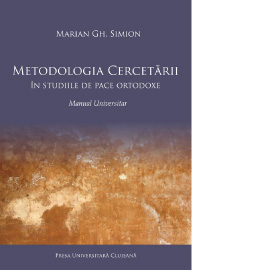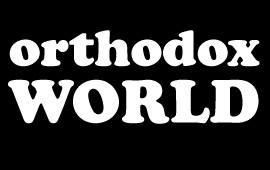|
view this email in your brouser here
|
 |
|
| Year 4 No 6 | April 18, 2018 |
Religion & Politics: An Aphorism |
“Religion and secular politics mirror into each other. They are a reflection of each other to the extent that they bind humanity together, or they divide it. They each claim power, and monopolize the meaning of life. In their quest for power, they are each other’s opposition, and perpetually deprecate each other. They are each other’s mimetic rival. They each define what can be shared in common, and what can be held in private. They each demand ownership over the common good. They each flourish under leaders, and crumble under demagogues. They each can make a human being a saint, or a beast.” (By Marian Gh. Simion) |
|
 EXTENDED DEADLINE EXTENDED DEADLINE |
CALL FOR PAPERS
4th International Conference ComSymbol
on
“Belief in Technology: Mediatization of the Future
and the Future of Mediatization”
Aurel Vlaicu University
November 8-9, 2018, Arad, Romania
|
|
IMPORTANT DATES!
 April 23: Abstract Submission April 23: Abstract Submission
 April 30: Abstract Acceptance Notification April 30: Abstract Acceptance Notification
June 15: Paper Submission
July 7: Paper Acceptance Notification
All proposals and questions should be addressed to: essachess@gmail.com
(DOWNLOAD DETAILS) |
CONFERENCE LANGUAGES: French or English
REVIEW & INDEXING: The proceedings will be reviewed and will have an ISBN. The proceedings will be published at a French Academic Publishing and will be submitted for indexing in a number of citation indexes including (Google Books, GESIS – Leibniz Institute for the Social Sciences, the ISI Thomson Web of Science, etc.). The 2014 and 2016 ComSymbol conference proceedings were indexed in the ISI Thomson Web of Science database. |
| |
|
invitation to participate in a survey
“Liberal Views of Religion
in Political Campaigning”
This survey is part of a field education project conducted by Shannon Noe`lani Schmidt, a graduate student at Harvard Divinity School and IPSEC Research Associate, under the supervision of Marian Gh. Simion, PhD. The survey attempts to study the presence of religion in political campaigning in the United States, and also to investigate the liberal attitudes toward this phenomenon. Therefore, the survey is limited to the United States of America. In order to collect reliable data, we invite only our US readers to participate in this survey. Thank you in advance for your participation, cooperation and understanding. If you have questions or concerns please contact Dr. Simion at office@ipsec.education. (Please click here if the survey does not appear below!) |
| |
|
| |
 |
| |
| |
|
|
| TESTIMONIAL |
| |
| “The instrumentalization of faith (particularly of Islam) for radical ideological purposes is an insult to believers of any religion. Therefore, faith-based peace research is a necessity more than ever. I am grateful for the academic work of the IPSEC; it has always been a privilege to cooperate with it, in its struggle for peace and understanding.” |
| |
 |
Prof. Dr. Heinz-Gerhard Justenhoven
Professor, University of Freiburg, Germany
Leitender Direktor, Institut für Theologie und Frieden |
|
FREE TEXTBOOK (in Romanian language)
Research Methodology in Orthodox Peace Studies:
university textbook by Marian Gh. Simion |
| |
 |
Metodologia Cercetării în Studiile de Pace Ortodoxe - Manual Universitar, Cluj–Napoca: Presa Universitară Clujeană, 2016 (Foreword Laurențiu Tănase, Editorial Coordination and Introductory by Study Cristian-Sebastian Sonea); 232 pages; ISBN 978–606–37–0104–7 This is a textbook on qualitative research methodology in the field of peace studies in Orthodox Christianity, authored by Marian Gh. Simion, in Romanian language. The textbook is organized around the structure of process, and it focuses on inductions, meaning-making, and verdicts. Inductions involve the standard information imparted by the institutionalized religion, concomitant with relevant faith phenomena. Meaning-making focuses on how inductions are interpreted by groups and individuals in position of power, under conditions of crisis. The verdicts are the byproducts of the refinement of inductions through meaning-making, which generate new cognitive and affective realities. CONTENTS: Preface by Laurenţiu Tănase | Introductory Study by Cristian-Sebastian Sonea; Author's Note; 1 Introduction: Religion and Collective Violence; 2 The Scientific Research of Religious Violence; 3 Factors of Induction; 4 The Context of Meaning (Trans)Formation; 5 Liminality and Communication; 6 Transformation and Interpretation; 7 The Essence and the Structure of Verdicts; 8 The Measurement of Verdicts and Opinion Poll; 9 Conclusions; Index |
|
Harvard Divinity School's inaugural
EXECUTIVE EDUCATION
|
| |
 |
The World Needs Thoughtful, Religiously Literate Leaders
June 18 to June 21, 2018
Join Harvard Divinity School’s
inaugural executive education program:
Making Change.
(details)
|
|
THE WORLD WE LIVE IN
REFLECT, ACT, and MAKE THE WORLD A BETTER PLACE! |
| |
 |
Russian Orthodox Church’s Patriarch Kirill discusses Syria with Pope Francis (RT)
International Orthodox Christian Charities Trains Refugees as Volunteer Healthcare Workers (IOCC)
Don’t wait for the western Balkans to blow up again. The U.S. and the E.U. must act (Washington Post)
For more news about conflicts affecting Orthodox Christians around the world, click here!
|
WORDS OF SPIRITUAL BENEFIT
|
| |
 |
“I have seen unlearned men who were truly humble, and they became wiser than the wise. Another unlearned man, upon hearing them praised, instead of imitating their humility, prided himself of being unlearned and so fell into arrogance.” (attributed St. Mark the Ascetic, On The Spiritual Law, 79-80)
|
|
SPONSOR A TEXTBOOK!
|
| |
 |
PATRON ($5,000)
5 FREE COPIES
20% discount for unlimited purchased copies
PLATINUM ($1,000)
1 FREE COPY
50% discount for three copies
10% discount for 10 purchased copies
GOLD ($500)
75% discount for one copy
10% discount for 10 purchased copies
SILVER ($300)
10% discount for 10 purchased copies
The first part reviews ancient Christian writings, rituals, religious laws, and contemporary writings, for the purpose of identifying the core teachings of the Orthodox Church on violence and peace. The second part explores themes such as ‘evil’ and ‘dualism’ for the purpose of comprehending heretical attitudes that emerged during times of war. Political subjects such as Just War and Nationalism are explored for the purpose of identifying instances when members of the Orthodox Church sanctioned defensive violence and bolstered xenophobia. The third part recommends peacemaking methods applicable to Orthodox Christian settings in light of the tripartite dimension of violence against God, self, and another human being.
|
| |
| |
|
|
| |
| |
|
| |
|
NEWSLETTER ARCHIVE
http://www.orthodoxpeace.org/news/
Institute for Peace Studies in Eastern Christianity, Inc.
Harvard Square | P.O. Box 380246 | Cambridge, MA 02238-0246, U.S.A. | msimion@OrthodoxPeace.org
| IPSEC Newsletter (ISSN 2473-9146) is the official newsletter of the Institute for Peace Studies in Eastern Christianity, Harvard Square | P.O. Box 380246 | Cambridge, MA 02238-0246, U.S.A. | www.OrthodoxPeace.org | The purpose of this publication is to disseminate information about our institute’s activity, and to disseminate selected news about conflicts affecting the daily existence of Orthodox Christians around the world, as well as various announcements from similar organizations. Focused on research, consulting and education, IPSEC’s goal is to make a positive contribution to the world peace by focusing on the role of religion in international and interreligious relations. IPSEC is affiliated with Harvard Divinity School as a field education agency; offering educational services to graduate students on the role of Orthodox Christianity in international relations, conflict, and policymaking.
We welcome your comments, queries, and suggestions; so please direct all correspondence to Dr. Marian Simion at newsletter@OrthodoxPeace.org |
|
|
|